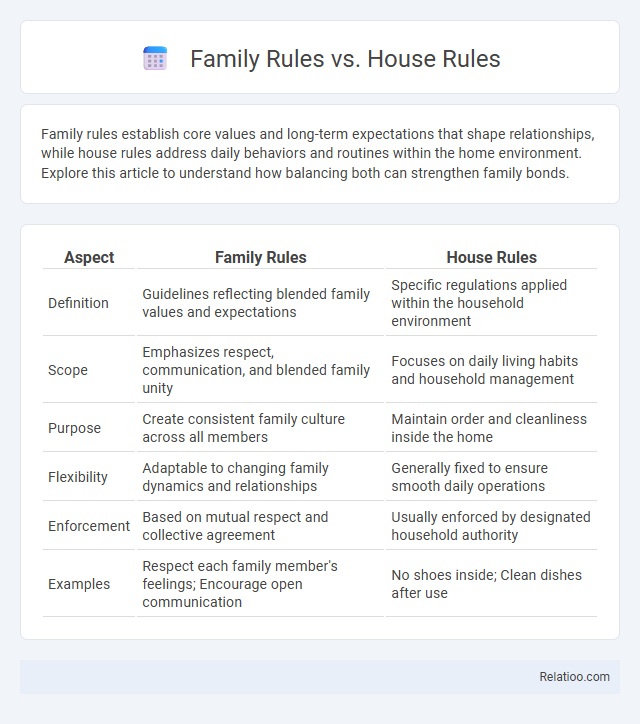Family rules establish core values and long-term expectations that shape relationships, while house rules address daily behaviors and routines within the home environment. Explore this article to understand how balancing both can strengthen family bonds.
Table of Comparison
| Aspect | Family Rules | House Rules |
|---|---|---|
| Definition | Guidelines reflecting blended family values and expectations | Specific regulations applied within the household environment |
| Scope | Emphasizes respect, communication, and blended family unity | Focuses on daily living habits and household management |
| Purpose | Create consistent family culture across all members | Maintain order and cleanliness inside the home |
| Flexibility | Adaptable to changing family dynamics and relationships | Generally fixed to ensure smooth daily operations |
| Enforcement | Based on mutual respect and collective agreement | Usually enforced by designated household authority |
| Examples | Respect each family member's feelings; Encourage open communication | No shoes inside; Clean dishes after use |
Understanding Family Rules vs House Rules
Family rules are the fundamental guidelines based on shared values that govern behavior and interactions within the family unit, reflecting long-term expectations and moral principles. House rules are specific, practical regulations established to manage daily routines and maintain order in the household environment, often focusing on chores, curfews, and screen time. Understanding the distinction between family rules and house rules is essential for fostering consistent discipline and clear communication, where family rules shape overarching behavioral standards and house rules address immediate, situational needs.
Key Differences Between Family and House Rules
Family rules typically reflect core values and long-term behavioral expectations centered on respect, trust, and communication, while house rules are specific guidelines governing day-to-day activities and household management such as chores, curfews, and screen time. Family rules emphasize ethical principles and emotional well-being across all settings, whereas house rules focus on practical routines within the home environment. Understanding these distinctions helps establish a balanced framework promoting both character development and orderly living.
Importance of Setting Family Rules
Setting clear family rules establishes boundaries that promote respect and responsibility among all members, creating a harmonious home environment. Unlike broader family values that guide overall behavior and house rules that apply to physical spaces, family rules provide specific, actionable guidelines tailored to your unique family dynamics. You benefit from defined expectations that reduce conflicts and foster consistent discipline essential for healthy relationships.
Benefits of Establishing House Rules
Establishing clear house rules creates a structured environment that promotes respect, responsibility, and cooperation among all family members. These guidelines help reduce conflicts and misunderstandings by setting consistent expectations for behavior, fostering a harmonious living space. Your family's well-being and daily interactions improve significantly when everyone understands and follows agreed-upon house rules.
Examples of Common Family Rules
Common family rules often include routines such as no phones at the dinner table, completing homework before leisure activities, and respect for elders. House rules typically focus on shared living expectations like no shoes inside the house, maintaining cleanliness in shared spaces, and curfews for children. Family values, in contrast, encompass broader principles such as honesty, kindness, and responsibility that guide behavior across various situations.
Examples of Effective House Rules
Effective house rules establish clear expectations such as "no screen time during family meals" or "chores must be completed before leisure activities," fostering discipline and respect within the home. Family rules often cover specific behaviors like curfews or guest policies, while family values emphasize core principles such as honesty, kindness, and responsibility. You can create a positive environment by tailoring house rules that reflect your family values and promote cooperation.
Creating Consistent Rules for Children
Creating consistent rules for children involves clearly distinguishing between family rules, house rules, and family values to promote understanding and stability. Family rules encompass broader expectations like respect and honesty that reflect core family values, while house rules are specific guidelines about daily routines and behaviors within the home environment. Establishing consistency in enforcing these interconnected elements helps children develop clear boundaries, fosters discipline, and reinforces the family's cultural and ethical framework.
Communicating Rules Clearly to the Family
Communicating Family Rules, House Rules, and Family Values clearly ensures consistent understanding and adherence among all members, promoting harmony and respect. Family Rules define behavior expectations rooted in core Family Values, while House Rules specify practical guidelines tailored to the living environment. Using clear language, consistent reinforcement, and involving family members in discussions enhances clarity and commitment to these rules.
Enforcing Family and House Rules Fairly
Enforcing family and house rules fairly requires clear communication and consistent application to create a balanced environment where everyone understands expectations. Family rules often encompass broader behavioral values reflecting family morals, while house rules address specific daily routines and boundaries within the home. Ensuring fairness involves involving all family members in rule-setting, applying consequences objectively, and regularly reviewing rules to adapt to the family's evolving needs.
Adjusting Rules as Kids Grow
Family rules, house rules, and family values each guide behavior but differ in scope and flexibility; family rules often address emotional and ethical expectations, house rules focus on household operations, and family values define core beliefs. Adjusting rules as kids grow involves recognizing developmental stages, allowing more autonomy while maintaining boundaries aligned with family values. This adaptable framework supports consistency and fosters responsibility, ensuring rules evolve with children's maturing needs.

Infographic: Family Rules vs House Rules
 relatioo.com
relatioo.com